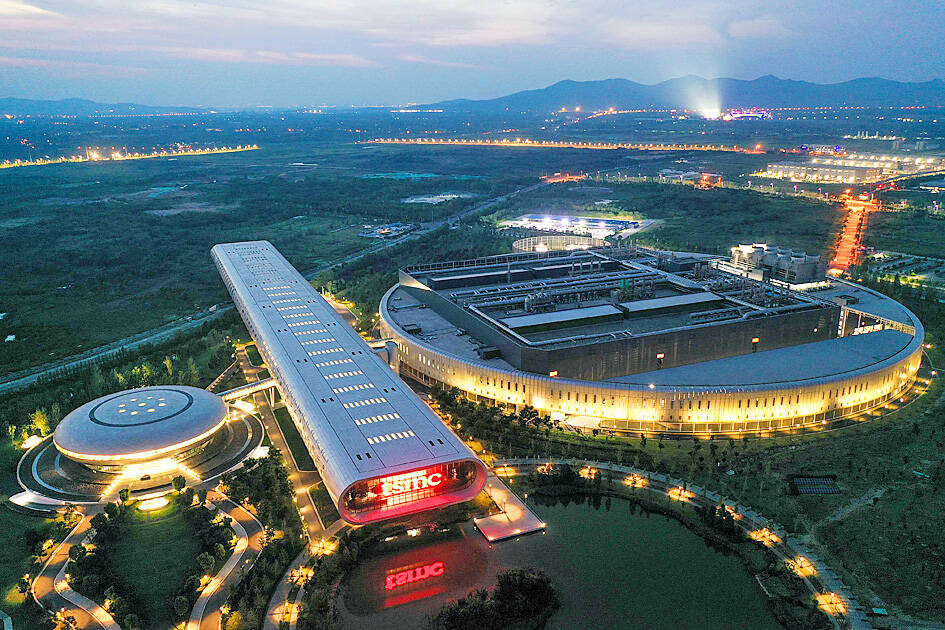The US government’s decision to impose new restrictions on the sale of semiconductors and chipmaking equipment to Chinese companies could hurt Taiwan Semiconductor Manufacturing Co (TSMC, 台積電), along with the Chinese foundries of South Korean chipmakers, information advisory firm TrendForce Corp (集邦科技) said in a statement on Saturday.
The measures announced by the US on Friday include a ban on advanced computing chips, including those used in artificial intelligence and high-performance computing, from being sold to China without a license. Production equipment is included in the ban.
That likely means Taiwan would be prohibited from selling semiconductor manufacturing equipment and advanced chips to Chinese companies, while sales to foreign companies operating in China would be reviewed on an individual basis.

Photo: AFP
The measures extend restrictions from standard semiconductors to memorychips, which could hurt Chinese and South Korean suppliers, TrendForce Center for Research Operations CEO Locke Chang (張小彪) said.
The companies making chips in China that could be most affected are Chinese chipmakers Yangtze Memory Technology Corp (YMTC, 長江存儲) and ChangXin Memory Technologies Inc (CXMT, 合肥長鑫存儲), and South Korean chipmakers SK Hynix Inc and Samsung Electronics Co, Chang said.
Semiconductor Manufacturing International Corp (SMIC, 中芯國際), China’s largest chipmaker, could see next year’s sales grow 50 percent slower than forecast, as the latest export curbs hamper its capacity buildup, Bloomberg Intelligence analyst Charles Shum (沈明) said in a note yesterday.
About 48 percent of SMIC capacity to be installed by next year requires gear from US tool makers such as Lam Research Corp and Applied Materials Inc, he said.
Because the restrictions cover chip sales by companies using US technologies, the sales of TSMC’s advanced chips from its Taiwan fabs to Chinese clients could also be curtailed, TrendForce said.
TSMC’s fabs in China and most of China’s homegrown chipmakers use 28-nanometer processes or above, which means many of the advanced chips that are under the restrictions come from outside China.
Chips used in high-performance computing by US and Chinese design houses are mostly made by TSMC using 7nm and 5nm processes, and the curbs could reduce orders to TSMC for those chips, TrendForce said without providing a precise estimate.
TSMC declined to comment on the curbs, saying it was focused on its quarterly earnings conference on Thursday.
Minister of Economic Affairs Wang Mei-hua (王美花) on Sunday said the ban would have a limited effect on Taiwanese suppliers, as they seldom receive orders from China for artificial intelligence and high-performance computing chips.
Additional reporting by Bloomberg

To many, Tatu City on the outskirts of Nairobi looks like a success. The first city entirely built by a private company to be operational in east Africa, with about 25,000 people living and working there, it accounts for about two-thirds of all foreign investment in Kenya. Its low-tax status has attracted more than 100 businesses including Heineken, coffee brand Dormans, and the biggest call-center and cold-chain transport firms in the region. However, to some local politicians, Tatu City has looked more like a target for extortion. A parade of governors have demanded land worth millions of dollars in exchange

An Indonesian animated movie is smashing regional box office records and could be set for wider success as it prepares to open beyond the Southeast Asian archipelago’s silver screens. Jumbo — a film based on the adventures of main character, Don, a large orphaned Indonesian boy facing bullying at school — last month became the highest-grossing Southeast Asian animated film, raking in more than US$8 million. Released at the end of March to coincide with the Eid holidays after the Islamic fasting month of Ramadan, the movie has hit 8 million ticket sales, the third-highest in Indonesian cinema history, Film

Taiwan Semiconductor Manufacturing Co’s (TSMC, 台積電) revenue jumped 48 percent last month, underscoring how electronics firms scrambled to acquire essential components before global tariffs took effect. The main chipmaker for Apple Inc and Nvidia Corp reported monthly sales of NT$349.6 billion (US$11.6 billion). That compares with the average analysts’ estimate for a 38 percent rise in second-quarter revenue. US President Donald Trump’s trade war is prompting economists to retool GDP forecasts worldwide, casting doubt over the outlook for everything from iPhone demand to computing and datacenter construction. However, TSMC — a barometer for global tech spending given its central role in the

Alchip Technologies Ltd (世芯), an application-specific integrated circuit (ASIC) designer specializing in server chips, expects revenue to decline this year due to sagging demand for 5-nanometer artificial intelligence (AI) chips from a North America-based major customer, a company executive said yesterday. That would be the first contraction in revenue for Alchip as it has been enjoying strong revenue growth over the past few years, benefiting from cloud-service providers’ moves to reduce dependence on Nvidia Corp’s expensive AI chips by building their own AI accelerator by outsourcing chip design. The 5-nanometer chip was supposed to be a new growth engine as the lifecycle